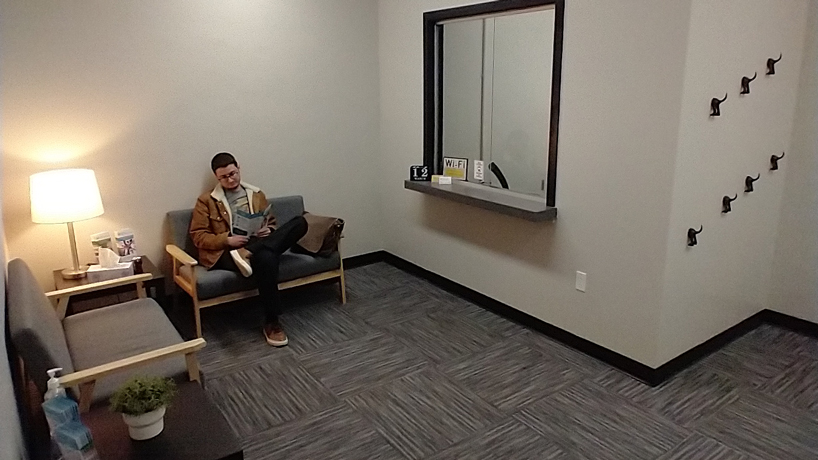
A man sits in the waiting area at the UMSL Center for Behavioral Health’s new office at the Family Resource Center in Union, Missouri. (Photo courtesy of Gregory Dahl)
Franklin County, like Missouri’s other 98 rural counties, faces a shortage of mental health professionals that has limited access to care, including psychological evaluations that are a crucial step in effective treatment.
The Center for Behavioral Health at the University of Missouri–St. Louis is working to try to close that gap. It recently opened a new office at the newly established Family Resource Center at 500 Clark Avenue, in Union, Missouri.
CBH psychologists began seeing patients at the office this month.
“The opening of this new office removes many of the barriers currently experienced by Franklin County children and their parents and, for the first time, provides easily accessible, comprehensive psychological evaluation services,” said Gregory Dahl, grants manager at the Center for Behavioral Health.
Evaluations will be provided by any of the Center’s 20 psychologists and will be free at the point of service thanks to funding by the Franklin County Community Resource Board.
The Center for Behavioral Health was established in 2014 to address the unmet need for child and adolescent psychological evaluations in the St. Louis region.
Since opening its West St. Louis County office, the Center has established a reputation as the region’s foremost provider of psychological evaluations. Every year, more than 3,000 families contact the Center seeking help for a broad range of mental health conditions.
It employs more than 50 clinicians who work with children and young adults to assess and diagnose a wide range of problems, such as learning difficulties, attentional problems, depression, anxiety, phobias, trauma-related stress, autism, psychosis, gender dysphoria and sexual and behavioral concerns.
Since 2014, the Center has served more 9,500 children, adolescents, young adults and families across the St. Louis region.
A 2020 report published by the Missouri Hospital Association, Missouri Department of Mental Health, Missouri Coalition for Community Behavioral Healthcare, Missouri Farm Bureau and the University of Missouri Extension noted that the prevalence of mental health needs among rural residents is similar to their urban counterparts.
“Yet rural populations utilize behavioral health care less frequently due to several barriers unique to country living: shortages of behavioral health providers and specialty care, higher rates of uninsured or underinsured, less anonymity, and cultural perceptions of mental health,” the report said. “These geographic barriers to access result in many rural populations forgoing care altogether or depending on hospital emergency rooms and other nontraditional services for their behavioral health needs.
Missouri has the largest shortage of mental health providers in the country, according to data from the Kaiser Family Foundation that showed just 3.7 percent of the need for mental health professionals met.
The Franklin County Community Resource Board began partnering with the Center five years ago to bring no-cost psychological evaluation program to Franklin County. The evaluations have provided clear and accurate diagnoses of mental health disorders for Franklin County children and a road map detailing which treatments and interventions are most helpful and effective.
“Our evaluations are key to helping both families and mental health professionals understand the extent of children’s difficulties, what is underlying them, and what needs to happen to ensure children get the help they need,” Center for Behavioral Health psychologist Ashley Darling said.
Families in need of services can complete a psychological evaluation referral form on the FCCRB website (www.franklincountykids.org) and professionals working with children can call 314-516-4357 to make a referral.














